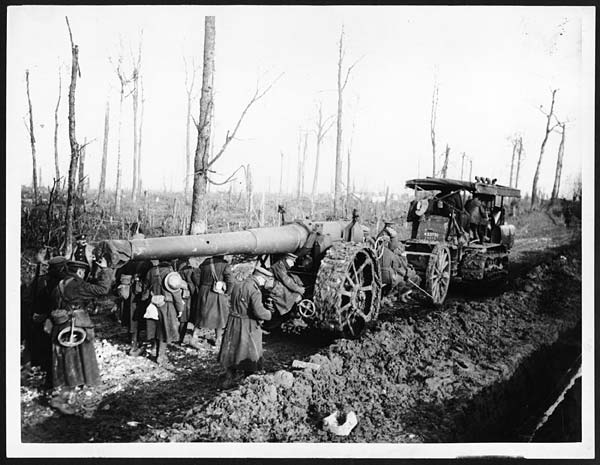Click here for all items related to: War literature
The experiences and emotions associated with war have always inspired poetry, prose and literary musings. We begin with the literature of World War I, but welcome discussion on all artistic response to wars, including music, painting, film and multimedia. If you wish to bring some work to our notice, please use our Comments system or contact us directly via the “About us” menu.

British official photo from the Western Front: a big gun going up to the front (image: Flickr Commons/National Library of Scotland digital.nls.uk/74548004)
‘The monstrous anger of our taciturn guns
The majesty of the insults of their mouths’
(Wilfred Owen, “But I was looking at the permanent stars”)
We open with an illustrated article from one of our volunteer researchers, Rod Olsen, introducing or reintroducing the poets of World War I. It includes a trove of links to material on these poets and to their work. Other material is in the pipeline, including the work of Australian poets and writers.
War literature often provokes strong reactions. The poet Shelley asserted in 1821: ‘Poets are the unacknowledged legislators of the world’. Literature is powerful. War literature can stir emotions where some would prefer that emotions did not intrude.
This was evident after World War I when some people considered certain war literature would affect the ability of governments to persuade citizens to take up arms. It might even reduce the propensity to fight. It might be seen also as reflecting adversely on those who had fought and sacrificed.
When the great outpouring of war literature was published in England a decade later [that is, in the late 1920s] – Sassoon, Blunden, Graves et al. – there were opinion-makers in Australia, as in England, who wanted nothing of it. The Age urged that such books be banned, saying that they “depicted life in the trenches as much more horrible than it actually was”. The Age endorsed English critics who “deplored the tendency of the authors of war books to belittle the men who fought for their country and depict them ‘as brutes and beasts who lived like pigs and died like dogs'”. (Michael Cathcart, Defending the National Tuckshop: Australia’s Secret Army Intrigue of 1931, McPhee Gribble/Penguin, Ringwood, Vic., 1988, p. 98)